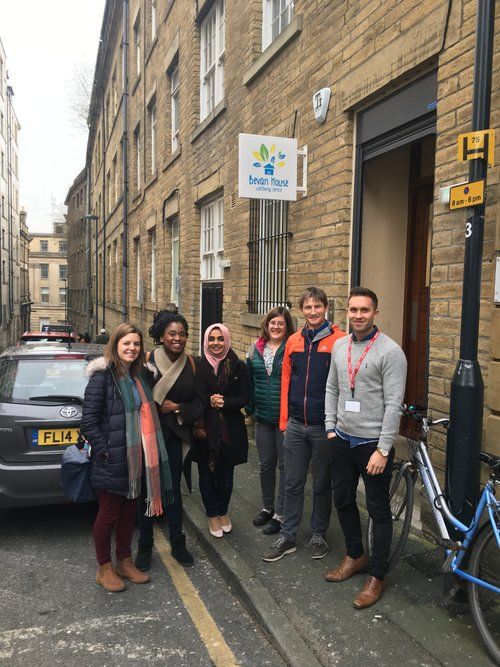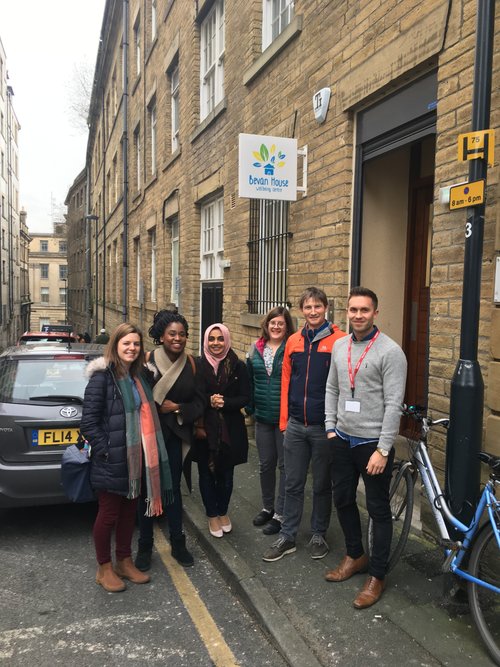
A social enterprise revolutionising primary care delivery for vulnerable groups

The day encompassed a full day practice visit to Bevan Healthcare GP practice in Bradford. Bevan Healthcare is a social enterprise, with a vision of providing healthcare to disadvantaged vulnerable groups. These patient groups may include the homeless, refugees, asylum seekers, victims of abuse, trafficking or those with drug or alcohol problems. The practice offers longer appointments, link workers, drop in clinics for patients, GPs with special interests in addiction and an outreach service which include a health ‘bus’ which provides a ‘street doctor’ service once a week on an evening for vulnerable patients including those involved in prostitution.
The practice works with third sector partner organisations to provide wellbeing groups, such as art or cookery classes, for vulnerable groups. On the day we were shown an art and textiles class ran for women who have been unfortunately been the victim of domestic violence in the past, with the focus on healing and recovery via supporting one another. We then met two GP’s who have a special interest in associated branches of medicine, for instance addiction. We discussed at length the reasons behind the majority of presentations for addiction problems. As per my previous learning on the subject, adverse childhood experiences were paramount in the majority of cases where alcohol and drugs were misused and the use perpetuated into addiction and the social problems that often arose. I learnt that more than three adverse childhood events was linked with higher levels of the likelihood of addiction and subsequent homelessness, including break up of parents, bereavement, experiencing sexual abuse and substance misuse within the family being the most common ACE’s. This was useful in thinking about the patient’s I see in practice who present with addiction, and did give me a new found empathy for them. We also discussed the various theoretical models which cover addiction and that suffering ACE’s is actually linked to neurophysiological changes that make addiction and sensitive the dopamine cascade involved more readily. We also discussed the various studies that have demonstrated the link between social environment and addiction. The two major studies discussed were Rat Park (1970) and Mintz’s 1979 work on looking at opiate use in soldiers returning from the Vietnam war. In both, the absence of a fulfilling and stimulating social environment perpetuated the use of opiates, whereas the opposite was true when subjects were given environments in which they felt safe, secure and had opportunities to engage with others readily. Again this helped me understand and empathise with those patients in a cycle of addiction and homelessness or difficult living circumstances and has certainly changed my attitude towards them.
Practically the day was really helpful in providing certain tips on how to manage such patients who are involved in addiction, for example the holistic care for someone with an opiate addiction may involve considering their dentistry, looking at injection sites for infection, prescribing PPI + antiemetics for nausea and vomiting, prescribing antihistamines and mentho-derm for pruritis and obviously laxatives for constipation secondary to the opiates. More tips included the widespread vitamin b and magnesium deficiency commonly found amongst these patient groups and also practical ways in which to ensure that patients can avoid malnourishment. We also heard of ways in which health care has been shaped by the patients, for example sexual health clinics for women involved in sex work, and the way this has reduced the number of cases of sexually transmitted infections amongst this population.
The day was extremely useful in shaping my attitudes and practice. It has given me more empathy and understanding towards patients who are battling addiction and the theoretical basis of adverse childhood events and sensitising the addiction pathways in the nucleus accumbens resonated with me as a clinician to easily understand the ways in which addiction can take hold and perpetuate, especially when people are exposed to the wrong social circumstances. The visit was helpful to see how a practice run as a social enterprise is run and how without the constraints of GMS, services can be set up to meet the demands of the patient population in a reflexive and timely way. This has also helped me reflect as I move forward in my career the potential for working with partner organisations and third sector agencies as healthcare provider.
Date of visit 18th Jan 2019
Dr Mathew Fortnam
